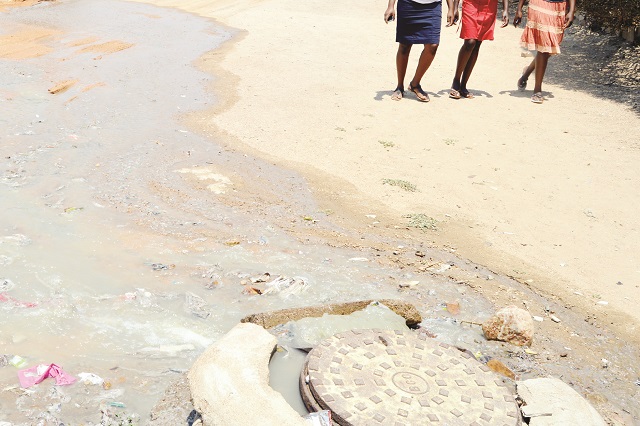Council health inspectors can help clean up our cities


Bulawayo residents negotiate their way past a burst manhole with spilling sewage that has blocked a road in Mpopoma suburb in this file photo. Sewer pipe bursts are now common in major cities and towns as councils fail to contain the problem
Saul Gwakuba Ndlovu
Bulawayo ushers in 2017 with a number of its suburbs flooded with sewage from burst pipes some of which have not been attended to for several months.
That has been the case in parts of Luveve and elsewhere where residents say they have got used to the horrible stench.
Similar unhealthy conditions obtain in a number of Zimbabwean urban centres where public health conditions have literally deteriorated to palpably alarming levels.
Bulawayo used to be one of this country’s cleanest cities, and so was Kwekwe, and even Kadoma in spite of its relatively unwieldy layout. Today these towns’ health conditions are direct threats to the residents, and indirect threats to those of all Zimbabweans at large.
If we consider the ease with which people travel regionally these days, and the short time it takes to move from one country to another in the region, and also the large number of people who cross borders daily, we can see how easily and quickly it is for a disease like cholera to spread from one nation to another.
It is thus vital that each nation should maintain safe health standards within its borders, in particular in its thickly populated centres.
Sewage reticulation and treatment are an important function of every local government authority, so is the disposal of garbage.
One of the “reasons” some white racialist settlers gave for opposing African majority rule was that it would result in what they described as “lowering of standards”.
It is understandable that there is a difference in the perception and appreciation of standards of personal and environmental hygiene between rural-based and urban-based adults. However, we should certainly sensitise every urban resident about the need to keep their environment clean.
That is a primary responsibility of town and city councillors. Good councillors hold regular and not occasional meetings in their wards to brief residents about municipal by-laws and development plans and projects.
It is the councillors’ duty also to educate residents about differences between Blair and the water-borne toilet systems. In the Blair toilets, newspapers can be used without immediate bad results, whereas in the water-borne system, blockages would occur, leading to sewage spill-overs.
That is why standard toilet paper has to be used in water-borne toilets. However, in case a newspaper has been used, leading to a blockage, a plumber should be called immediately. Should a plumber be difficult to get, large quantities of boiling water may be poured into the toilet to disintegrate the newspaper.
This technique works provided the newspaper quantity that has caused the blockage is relatively small and is lodged fairly close to the toilet seat so that the boiling water’s temperature would still be quite high by the time the water reaches the blockage.
It is much better to get a professional plumber, of course, than to use the trial and error method to clear toilet blockages.
Municipal councils have medical officers of health responsible for their clinics. These are senior council employees who head a department some of whose members are health inspectors.
A health inspector is responsible for an area comprising a couple of suburbs such as Makokoba, Thorngrove, Nguboyenja, Mzilikazi and Barbourfields. They are supposed to monitor garbage disposal, among other responsibilities.
It is very important to have such health personnel as their professional services establish and maintain the municipal councils’ required environmental health standards.
Health inspectors’ services are required especially now because of the number of vendors found along every street. The presence and operations of vendors contribute to littering and garbage accumulation.
Health inspectors’ effectiveness depends on their mobility, something that can be achieved by the provision of small motorcycles with a minimum fuel consumption capacity. It is those health officials that could work hand-in-hand with councillors to hold regular health meetings in every ward.
Other cultural institutions that could be roped in to improve cleanliness of our urban centres are churches. This is probably the best time to do so in view of the large number of churches that virtually sprout at one or other street corner.
In urban areas, most of these churches in Bulawayo use the English language in their sermons and prayers. Because of that, their leaders and members would very much appreciate participating in regularly cleaning up their respective surroundings because they say in English: “Cleanliness is next to Godliness.”
Simply stated, that means God’s worshippers should maintain a high level of bodily and environmental hygiene. They could be requested to clean localities within say a kilometre or so radius of their church building.
It is very very important to remember that the dirtier a house, or a village or a town or a city becomes, the less habitable (livable) it becomes. That has happened elsewhere in Africa, resulting in new capital towns being built, an exorbitantly costly undertaking that gobbles up billions of money that could have been used for much more important social services and facilities.
During the presidency of Felix Houphouet-Boigny, Abidjan, the capital city of his country, Cote d’Ivoire, was spotlessly clean. It was a pleasure to stroll along its avenues.
The contrast between the hygienic condition of Abidjan and that of Lagos in Nigeria was shockingly vast. There is no reason why the towns of Zimbabwe should not emulate Abidjan of Houphouet-Boigny and not those cities where garbage has become an official landmark.
Saul Gwakuba Ndlovu is a retired, Bulawayo- based journalist. He can be contacted on cell 0734 328 136 or through email. [email protected]











Comments